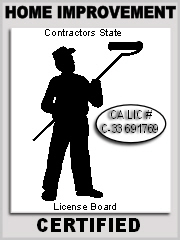 A guide to help you achieve a good experience
A guide to help you achieve a good experience
Often times, I hear customers complaining about having had a horrible experience with hiring a contractor. It cost them time, money, energy and peace of mind. We would like to help you avoid this costly mistake.
Qualify each separate estimate that you receive with the criteria below and you will have a good idea of "who's who" and "what's what" in the world of contractors. Before we get started, let me say that I'm surprised at how few owners look into the legal requirements with a contractor until there is a problem, at this point it is usually too late. In all my years of business, I'm also surprised at how few people have ever asked. Make it a point to request proof of the following before you consider hiring:
Unlicensed Contractors
Did you know that the California State Contractor's License Board is actually under the Consumer Affairs Division? They are on the consumer's side, not the contractors'. You may be tempted to save money by hiring an unlicensed contractor or handyman to work for you. Though there may appear to be substantial savings up front, you are not legally protected, and there is no recourse if you are unhappy with the work. You don't want to get stuck in a shady deal.
Check Their State Contractor's License Status
Make sure they're in compliance with the requirements of the California State License Board (CSLB). Checking a contractor's license number by phone (1-800-321-CSLB) or on the website http://www.cslb.ca.gov/ is the best way to be aware of the favorable or unfavorable standings of a contractor. Check out their website; it's full of consumer info. Pro-Craft Painting is proud to say that our license is always in excellent standing with the CSLB.
Check Their General Liability Insurance
You'd be surprised at how many contractors cut corners and don't carry liability insurance, which means you will be left to pay the bills for any damage done to your house by the contractor. It is recommended they carry $1,000,000 to $2,000,000 worth of coverage. This will protect you if they drop a ladder on your car, or in a more extreme case, burn your house down on accident. You wouldn't want to pay for that, too! Pro-Craft Painting carries a minimum of a $2 million dollar policy in each year of doing business. Ask for written proof of a current policy.
Contractor Surety Bond
All contractors must be bonded, but most people do not know what this bond is for. The surety bond is in place to protect you in case the contractor does not pay his subcontractors or for materials used on your project. Without this mandatory bond, they may come after you.
Worker's Compensation Policy
It's scary to hear about how many contractors that say they are legal, but actually pay their workers illegally under the table and put homeowners at GREAT risk. Let's say that a worker gets injured on your property. Did you know that you can be held liable for ALL EXPENSES, medical bills and missed work for that employee for many years to come, unless the contractor has a current Worker's Compensation policy? Well, it's true. Don't risk your future on a "good deal" that seems nice enough at first, but is really cutting corners and putting you at risk. Pro-Craft Painting covers all of our workers under an active compensation policy.
References
Along with the references, it might be a good idea to check with the Better Business Bureau, as they record complaints, issues, and a bad business record. Pro-Craft Painting has many local references, and you won't hear about us at the BBB.
Questions and Answers About Hiring A Contractor
Estimate Prices
Q. I've received multiple estimates, and there were big differences in price. How do I make sense of it all?
A. You will receive estimates in many different price ranges. First, realize that it costs every contractor the same amount of money if they are in compliance with all requirements, and we all have somewhat similar costs of business and material related needs. The difference is usually in the details in the written estimate and the job scope. Low prices generally reflect planned corner cutting procedures, inexperienced job insight or poor understanding of the costs involved with your project.
Choose a contractor in the mid to high range. They probably hire workers with better skills, you'll be happier with the work performed, and they're more likely to still be in business in case you want to use them again or need to use their warranty program. It is far better to pay a higher cost one time than it is to pay a lot less and have to do it twice, or twice as often. Pro-Craft Painting does not try to outbid other contractors, but we do reflect what it will truly take to do the job right the first time in our estimate package.
Industry Standard
Q. Is all painting performed the same, and are the long term results the same?
A. The answers are NO and NO. Unfortunately, there is not a standardized way to prepare and paint in the industry, so you have to be very careful who you hire. Every painting company preps and paints differently. A great indication of a competent contractor is one who carefully measures the structure to be painted, discusses all preparation techniques with you, and accurately reflects this in the total estimate price. In short, if they can't take the time to inspect your property thoroughly before an estimate, then they probably won't after they've started painting, either. Pro-Craft Painting has spent years studying our craft, and we understand why paints fail and how to repair, not just prepare over it.
How Many Coats Do I Need
Q. How many coats of paint should the contractor include in the estimate? 1, 2, or 3 coats?
A. After proper priming, technically speaking, the answer is neither 1, 2 or 3. When new paint has COMPLETELY covered the existing paint or primer, then enough paint has been applied. If not enough paint has been applied, then you can see through to the old color or primer. Too much paint, and it may peel off in chunks over time. Look for an estimate that includes "full coverage" on all areas to be painted. Pro-Craft Painting does provide full coverage on all areas.
Down Payment
Q. How much money should be given to the contractor for a job deposit or down payment?
A. By law, any contractor can only receive 10% of the job total or $1000.oo (whichever is less). Occasionally you'll find a contractor that does not require a down payment and accepts payment in full upon completion of the work. This will allow you to inspect their work before you have to pay for it, which takes the some of the risk and fear out of hiring them in the first place. At Pro-Craft Painting, we do have this policy; we charge 0% down on any job under $5000.oo
I hope this information has helped you. Remember that searching the bargain bin for a great price on an estimate is inviting problems into your project. There is nothing worse than hiring a nice contractor that soon realizes he has bid the job too low, starts grumbling and cutting corners to compensate, then your "good deal" turns into a problem.
If you are really looking for an inexpensive job, then you might want to consider doing it yourself. If you decide to hire a professional contractor, do yourself a favor and make sure they're in business legally.
